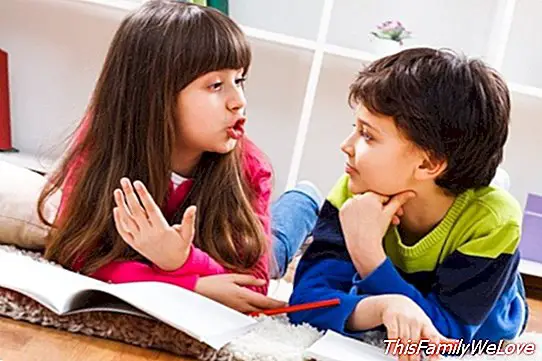Activities to develop children's empathy

The empathy it is the ability to put yourself in the place of the other. It is fundamental to educate our children in empathy to go beyond themselves and be able to see each other and put themselves in the shoes of others. The activities to develop children's empathy It will provide important advantages for both their social relationships, as well as their well-being and emotional balance.
Empathy is a fundamental skill for healthy and satisfying social relationships, since it implies being able to understand what the other is thinking and what the other is feeling. Empathy is a skill that is scarce in our days, in a society where everyone cares about their own good.
Benefits of empathy for children and adults
1. Putting yourself in the place of the other, in a complete and profound way will lead us to more real interpretations of situations, to understand others and to understand ourselves.
2. Empathy drives the personal growth and development of each one of us, since seeing through the eyes of another allows us to see ourselves better.
Empathy is a valuable resource for children
The empathy is the ability to read others. Empathy is a skill, which could be understood as an extraordinary quality that consists of being able to put yourself in the skin of the other to understand what the other is feeling and what he is thinking.
Empathy is a quality because it implies a development that is not always simple. For its development it is necessary to go beyond oneself, to go beyond self-centeredness and to start making interpretations based on the external gaze and not on one's own.
The development of empathy is a valuable resource that will enhance the social skills of children. It is a resource that will boost their development and lead them to less biased and more realistic interpretations of reality. The human being tends to egocentrism and interpretations based on oneself, empathy is one of the bases to open the mind and make realistic interpretations of what happens around us.
The importance of developing empathy in early childhood education
The development of empathy is a fundamental part of the person's development because:
- Encourages emotional development, It allows children to focus on what is around them instead of focusing attention on oneself.
- Improves social relationships and interactions are richer, with stronger links.
- Contributes to socialization.
- It has an important role in the development of emotional intelligence, being one of its basic components.
- Empathy is the key to being loved by others and for a healthy self-esteem.
Activities to develop the empathy of our children
1. What happens to others? Initiation activity for children from 3 years.
The dynamic consists of using drawings of faces with the basic emotions (joy, sadness, fear, anger, surprise, love and disgust). It is about asking the children to identify the different emotions that each of the faces represents. After all, we will answer the question, what happens to others? Trying to explain how they feel, what may have happened to make them feel that way and what they have to be thinking.
2. I put myself in your place. Activity to put ourselves in the shoes of others.
For this game cards are prepared in which we write different characters (dad, mom, grandfather, teacher, police, doctor, dentist, driver, grocer, etc.) and we also prepare material to disguise ourselves. We give a card to each of the children and we explain to them that we have to transform ourselves into what has touched us, we have to think about how he is dressed, how he moves, how he acts normally.
3. How would you feel, yes ...? Activity to deepen.
In this dynamic we will use scenes from stories, movies, series, readings, etc. We explain the situation and the event, we ask them to close their eyes and think that they are the person to whom the situation has happened and that they try to think and feel like that person. Next, we ask you to answer the question, how would you feel, if *?
4. Explorers of others. In this dynamic we will be explorers to find out what he thinks and feels about another person.
We choose one of the participants at random and we tell him a fictitious situation that he is going through. This participant must express how they feel and what they think but not tell others. The others with questions will have to find out how they feel and what they think.
Celia Rodríguez Ruiz. Clinical health psychologist. Specialist in pedagogy and child and youth psychology. Director of Educa and Aprende.
Author of the collection Stimulate the reading and writing processes




